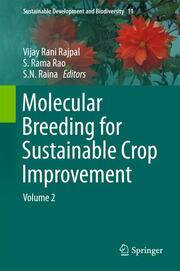Detailansicht
Molecular Breeding for Sustainable Crop Improvement
Volume 2, Sustainable Development and Biodiversity 11
ISBN/EAN: 9783319270883
Umbreit-Nr.: 8738427
Sprache:
Englisch
Umfang: xi, 478 S., 44 s/w Illustr., 12 farbige Illustr.,
Format in cm:
Einband:
gebundenes Buch
Erschienen am 12.02.2016
Auflage: 1/2016
- Zusatztext
- The world population is estimated to reach to more than 10 billion by the year 2050. These projections pose a challenging situation for the agricultural scientists to increase crops productivity to meet the growing food demands. The unavailability and/or inaccessibility to appropriate gene pools with desired traits required to carry out genetic improvement of various crop species make this task formidable for the plant breeders. Incidentally, most of the desired genes reside in the wild genetic relatives of the crop species. Therefore, exploration and characterization of wild genetic resources of important crop species is vital for the efficient utilization of these gene pools for sustainable genetic improvements to assure food security. Further, understanding the myriad complexities of genic and genomic interactions among species, more particularly of wild relatives of crop species and/or phylogenetically distant germplasm, can provide the necessary inputs to increase the effectiveness of genetic improvement through traditional and/or genetic engineering methods. This book provides comprehensive and latest insights on the evolutionary genesis of diversity, access and its utilization in the evolution of various crop species. A comprehensive account of various crops, origin, exploitation of the primary, secondary and tertiary gene pools through breeding, biosystematical, cytogenetical and molecular phylogenetical relationships, and genetic enhancement through biotechnological interventions among others have been provided as the necessary underpinnings to consolidate information on the effective and sustainable utilization of the related genetic resources. The book stresses upon the importance of wild germplasm exploration, characterization and exploitation in the assimilation of important crop species. The book is especially intended for students and scientists working on the genetic improvement of crop species. Plant Breeders, Geneticists, Taxonomists, Molecular Biologists and Plant Biotechnologists working on crop species are going to find this book very useful.
- Kurztext
- Molecular Breeding for Sustainable Crop Improvement, Volume 2 focuses on integration of advances in genetics, cytogenetics, molecular biology and biotechnology aimed at alien gene introgression for genetic improvement of major crop species at molecular level to help overcome the limitations associated with conventional plant breeding.This book includes articles on the availability and application of modern genomic approaches, tools, and resources in a precision breeding approach. The contributions involve the use of molecular markers and linkage, QTL and association mapping of agronomic traits to identify candidate genes and to design functional markers for marker assisted selection (MAS), gene pyramiding using MAS coupled with marker assisted back cross breeding (MABB), next generation sequencing (NGS) to generate genome wide markers and screen new alleles, and targeting induced local lesions in genomes (TILLING) or ecotype TILLING (EcoTILLING) for the screening of either mutant or natural germplasm collections to integrate genomic information into directional and selective breeding in crops to maximize genetic gains. Breeders, taxonomists, geneticists, cytogeneticists, molecular biologists and biotechnologists are going to greatly benefit from this book. We sincerely hope that this book will serve as a milestone in the precision breeding of crops to achieve meaningful plant genetic improvement.
- Autorenportrait
- Raina's quality research is evidenced by his publications in journals of international repute like Gene, AOB Plants, Applied Biochemistry and Biotechnology, Molecular Breeding, Molecular Phylogenetics and Evolution, Theoretical and Applied Genetics, Genome, Plant Breeding, Euphytica, Genetica, Heredity, Journal of Heredity, Cytogenetic and Genome Research, Methods in Cell Science, In Vitro Cell. Dev. Biol. - Plants, Plant Systematics and Evolution, Molecular Phylogenetics and Evolution, Caryologia, Genetic Resources and Crop Evolution, Plant Cell Reports, Annals of Botany among others. He has 135 publications, including 111 research papers, and 20 book chapters. The impact factor of his published papers ranges from 0.5 to 4.5 and the citation index touches nearly 2000. Raina has given invited seminars and keynote addresses in scientific forums in many countries, and has chaired symposia, seminars and scientific sessions in national and international conferences. He is a Fellow of National Academy of Sciences (F.N.A.Sc), India, and is credited with 17 M.Phil and 23 Ph.D. thesis Dr Rani has published 20 research papers in international peer reviewed journals like Plant Cell Reports, Genome, Genetica, Plant Systematics and Evolution, In Vitro Cellular Developmental Biology (IVCDB) Plant, Genetic Resources and Crop Evolution, Applied Biochemistry and Biotechnology. In addition, she has contributed five review papers in books published from Springer Verlag and Kluwer Acad. Publ. and CRC Press Ltd. Dr Rani has presented her research as an invited speaker in many national and international conferences. She is a member of International Society of Plant Morphologists and NewYork Academy of Sciences, USA Rao's research activity has been published (and still is) in international renowned journals.
